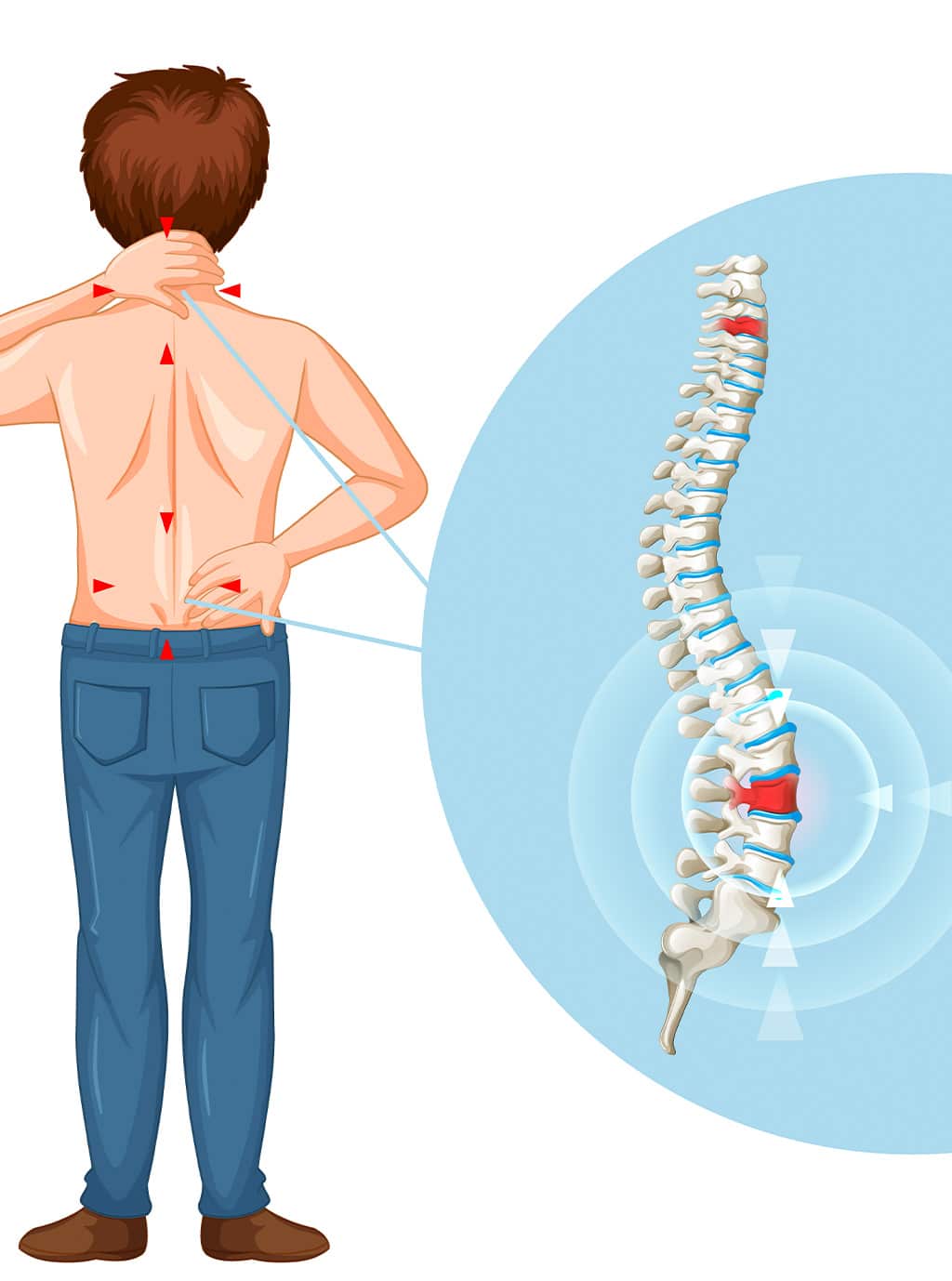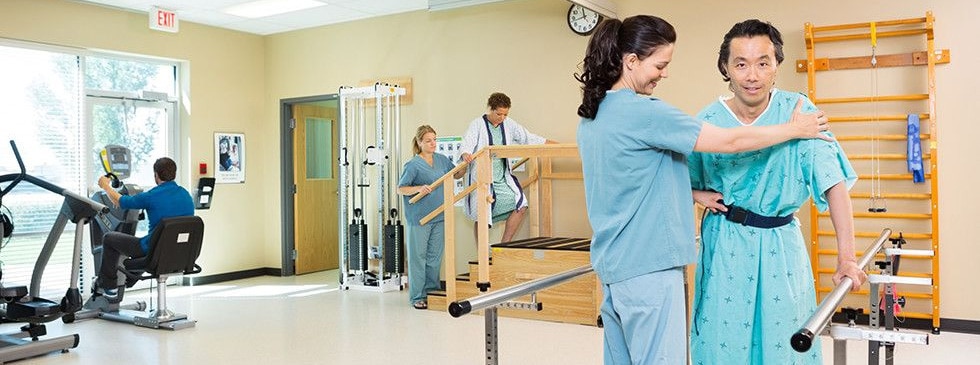
Loading. Please wait.

Loading. Please wait.
At Denville Medical, your licensed physical therapist's goal is to maximize your body's structure and increase its overall function for long-term health. To accomplish this, our physical therapists combine traditional and innovative techniques focused on increasing muscle strength and improving the body's range of motion. Our goal is to discover the root cause of your pain or mobility problems. That way, we can address the true reason why you need physical therapy, and work towards achieving long-lasting relief.
Of course, we understand that every patient is different. Your doctor can provide expert care in an encouraging environment by creating a customized treatment plan for you using modern, evidence-based research.
Some common reasons why patients need physical therapy at Denville Medical include:
1.
Sports Injuries Whether you are on the varsity team of your high school football team or a professional athlete, sports injuries are serious business. Our doctors and physical therapists will develop a plan to help you heal properly, so you can get back in the game sooner rather than later.
2.
Pre and Post Operation With decades of combined experience, our physical therapy experts know that there is a time for gentle healing and a time for aggressive physical rehab. Whether you are scheduled for surgery or have recently been released from the hospital, our therapists are here to help you recover, one step at a time.
3.
Neurological Issues At Denville Medical, we treat much more than sports-based injuries. Whether you're suffering from Multiple Sclerosis, Parkinson's, or a vestibular problem, our therapists are trained and certified to help you regain your body's optimal functionality.

Life has a habit of throwing us curveballs. Sure, some surprises only hurt your bank account, like expenses around the home. But more serious incidents, like car wrecks, can inflict physical injuries causing long-term pain. Injury-related problems like neck and back pain affect many Americans daily. Even worse, many hardworking people turn to addictive pain medication and invasive surgeries for relief, only to find themselves deeper in a hole.
If you're in chronic pain or suffer from range of motion problems, you should know that options are available for safer, more effective pain relief. One of the most commonly used solutions is physical therapy. The main goal of physical therapy is to maximize your body's mobility and increase overall function. In order to accomplish this, physical therapy techniques focus on improving range of motion and building muscle strength.
Physical therapy helps people of all ages with illnesses, medical conditions, or injuries that limit their mobility and body functionality. At Denville Medical and Sports Rehabilitation Center, our doctors and physical therapists create customized physical therapy programs to help patients reclaim their lives.
When combined with diet and exercise, many patients are able to enjoy activities that they only thought possible with youth.
Some of the most common techniques that physical therapists use to help patients include:
From improper ergonomics at your office desk to injuries sustained in car wrecks, neck pain is a widespread problem. Taking the proper preventative steps to deal with pain provides relief and can prevent the need for surgery or medication.
Generally, there are two kinds of neck pain: chronic and acute. Acute pain shouldn't last for more than six weeks, while chronic pain can last months or even years. Physical therapy is one of the most recommended treatments for neck pain. Treatments often involve reducing neck exercise, strength training, and stretching. If you're suffering from acute or chronic neck pain, it's important to have tests done by a physical therapist to determine the extent of your injury.
Neck pain is caused by a wide range of problems, like:
After identifying the underlying cause of your condition, your physical therapist will develop a comprehensive treatment to address your pain and provide long-term relief.

Back pain is one of the leading causes of disability in America. Back pain can start innocuously as a small muscle ache but can quickly become a more serious problem that disrupts daily life. Like neck pain, the best way to address the issue is to understand the root cause so that surgery is avoided.
Also like neck pain, back pain is either chronic (longer than six weeks) or acute (less than six weeks). Back pain can be caused by a number of events, like lifting a heavy item or simply sitting wrong for too long. To determine the extent of your injuries, you will need one or more diagnostic tests, like X-rays or MRI scans. Once the root cause of your condition is revealed, your physical therapist will work with Denville Medical doctors to create a treatment plan tailored to your body.
Common conditions linked to back pain include:

Experiencing a herniated disc is something most people dread, but many have to endure. Luckily, PT plays a significant role in herniated disc recovery. Physical therapy not only provides immediate pain relief, it teaches patients how to condition their bodies to avoid worse injuries.
At Denville Medical, our physical therapists and doctors have years of experience helping patients rehabilitate from herniated discs. Patients benefit from several time-tested techniques to relieve pain.
After diagnostic testing, active and passive treatments can include:

Do your hips feel uneven or misaligned? Do you suffer from hip stiffness or pain when the weather changes? Are you having trouble getting around the house like you used to? Your hips bear most of your weight, so it's no surprise that hip pain is very common among Americans.
Fortunately, physical therapy has been proven to provide relief for people dealing with acute or chronic hip pain. As with other forms of pain, you will need diagnostic testing to determine the extent of your hip problems.
Some common causes of hip pain include:
Once your hip issues are properly diagnosed, it's time to find relief. Denville Medical & Sports Rehabilitation Center offers several custom solutions, including acupuncture, chiropractic care, and personalized physical therapy.

Like hip pain, knee pain is a common condition in the U.S. and affects millions of people every year. Pain in the knee is caused by many things, including strains, injuries, age, and repetitive trauma. Sometimes, there's no apparent reason for knee pain. When it occurs, you may experience limited knee functionality, like difficulty standing, walking, sitting, and walking up and down stairs.
There are many conditions associated with knee pain, including:
If you notice symptoms like clicking or popping sounds, locking, inflammation, or sharp pains in your knee, physical therapy might be your best bet for relief.

Sometimes, surgery is the only option a patient can choose to alleviate pain from injuries and accidents. When this is the case, physical therapy plays a vital role before and after surgery.

To help you get a better sense of the scope of our physical therapy treatments, we're listing some of the most frequently asked questions that we receive at Denville Medical:
Answer : While some physical therapists rely on outdated techniques to treat patients, our team uses a combination of tried-and-true methods and modern strategies, including:
Answer : During your first visit with our physical therapist, we will complete a series of tests and screenings to establish a baseline for your care. You can expect to complete stability screenings, strength tests, and computerized range of motion tests. These tests ensure your doctor understands how your muscles are functioning. Once complete, your therapist will create a custom treatment plan for your physical therapy, so we can move forward with your care. During your time at Denville Medical, you should expect adjustments to your treatment plan as you make progress.
Answer : We get this question a lot, and we can certainly understand why. Unfortunately, we cannot provide you with an exact answer because every patient has different needs relating to their injuries and issues. Your level of stability and functionality depends on your condition, your goals, and your motivation to heal. For acute pain, patients typically experience relief in 2-3 weeks. Patients with forms of chronic pain usually feel optimal results after their first full course of therapy (4-6 weeks). Since our goal is to achieve maximum medical improvement, our doctors continuously monitor your progress and adjust treatment accordingly.
Whether you're dealing with chronic knee pain or acute back pain, relief is in sight. Rather than dangerous medicines and invasive surgeries, we specialize in non-surgical treatments like physical therapy. Our team of physical therapists, chiropractors, acupuncturists, and primary care doctors have years of experience and work hand-in-hand to give you real pain relief.
If you're sick and tired of living life full of physical pain, now is the time to act. Don't let your body deteriorate – find your new lease on life at Denville Medical and Sports Rehabilitation Center.
 973-627-7888
973-627-7888
It’s not uncommon for students leaving school in the Chathams to be met by a swarm of idling cars and school buses. Although many newer cars meet Advanced Clean Car standards, virtually all cars, except electric vehicles, still produce exhaust. Until all vehicles are zero-emission, we should make every effort to limit everyone’s exposure to exhaust.Many new cars have Auto Start/Auto Stop technology (AST), a technology that turns off the engine when your foot has been on the brake for a preset number of seconds and restarts...
It’s not uncommon for students leaving school in the Chathams to be met by a swarm of idling cars and school buses. Although many newer cars meet Advanced Clean Car standards, virtually all cars, except electric vehicles, still produce exhaust. Until all vehicles are zero-emission, we should make every effort to limit everyone’s exposure to exhaust.
Many new cars have Auto Start/Auto Stop technology (AST), a technology that turns off the engine when your foot has been on the brake for a preset number of seconds and restarts the engine when you ease off the brake. The AST saves fuel in stop and start driving and when waiting in a line. More importantly, it decreases air pollution.
Idling can contribute to fuel residue buildup on engine cylinder walls because the fuel is not burned completely as when a car is in motion and the engine is firing more rapidly. Idling also causes condensation in the exhaust system which can result in corrosion. Turning your engine off while waiting in line does not damage your vehicle.
Sign Up for FREE Chatham Newsletter
Get local news you can trust in your inbox.
This site is protected by reCAPTCHA and the Google Privacy Policy and Terms of Service apply.
Going idle-free at home is just as important. Modern automobiles do not need to warm up for more than 30 seconds. The best way to warm your cars engine is by driving your car.
Idling occurs when a vehicle that is turned on but is not in motion. To help keep our air clean, New Jersey passed a No Idling Law in 1986. Put simply, the law “limits vehicular idling to 3 minutes and idling is NOT permitted for the purpose of heating or cooling the driver or passengers.” The law covers gasoline and diesel vehicles and includes several exceptions. For more information check these websites:
https://www.nj.gov/dep/enforcement/idling_fact_sheet_1.pdf
https://www.nj.gov/mvc/pdf/license/drivermanual.pdf page 50.
In November 2023, Governor Murphy signed the Advanced Clean Cars II (ACCII) standards, which will go into effect with model year 2027 light-duty vehicles. New Jersey is now one of fifteen states to have adopted the standards. The New Jersey bill sets annually increasing sales targets for automakers, so that every new light-duty vehicle sold in the state will be a zero-emission vehicle (ZEV) or a plug-in hybrid electric vehicle (PHEV) by 2035.
In the meantime, we can all help make our community healthier by using our car’s AST or by turning off a gasoline or diesel engine when waiting in a line. Collectively making simple, small changes can have very big and beneficial effects on the balance of nature and on human health.
CHATHAM, NJ — Chatham Township officials recently announced the acquisition of an 18-acre property located on Southern Blvd., commonly known as the Fenske property.The announcement was made at the Nov. 28 township committee meeting.According to Mayor Ashley Felice, the acquisition cost the township a total of $750,000; however, $350,000 was donated by the Morris County Open Space Trust Fund."After years of diligent negotiations, I am pleased to announce that Chatham Township has entered into a strategic agreem...
CHATHAM, NJ — Chatham Township officials recently announced the acquisition of an 18-acre property located on Southern Blvd., commonly known as the Fenske property.
The announcement was made at the Nov. 28 township committee meeting.
According to Mayor Ashley Felice, the acquisition cost the township a total of $750,000; however, $350,000 was donated by the Morris County Open Space Trust Fund.
"After years of diligent negotiations, I am pleased to announce that Chatham Township has entered into a strategic agreement to acquire the approximate 18 acres of land… The acquisition of the Fenske property has been a long-term goal for our community, and tonight we will be introducing two ordinances to finalize the preservation of this property," Felice said.
The Fenske property, located at 422 Southern Boulevard, is next to Nash Field and the Great Swamp, making it an important piece of land for conserving open space in the township.
"This strategic move aligns with our ongoing efforts to enhance the quality of life for current and future generations. By acquiring this property, we are not only securing a valuable green space but also fortifying our commitment to environmental conservation," Felice said. "The proximity to Nash Field and the Great Swamp makes this acquisition a pivotal piece of our community's green infrastructure, providing environmental preservation, supporting biodiversity, and maintaining the scenic beauty that defines Chatham Township."
Some concerns were raised over the use of a bond ordinance to help pay for the acquisition; however, Chatham Township's administrator, Zaid Shehady, explained that the bond was simply a precaution.
"We are not planning to bond anything. However, we don't have all of this cash right now to authorize it because of a cash flow issue, but we are finishing up with this year, and by the time we enter into 2024, which is when we expect the closing to happen, we don't have those funds right now in order to actually appropriate them. This guarantees that we will have that money, but come April or May, whenever we get to closing, we should have that cash flow starting to come in," Shehady said.
Funding for Morris County open space acquisitions and preservation comes from the voter-approved Morris County Open Space & Farmland Preservation Trust Fund, which is generated by a special county tax.
The funding source is also used for farmland and historic preservation, county parkland acquisition, trail development and the purchase of residential properties prone to flooding.
Since 1994, the Morris County Open Space Program has preserved more than 17,800 acres – which is larger than the Township of Parsippany-Troy Hills – with approximately $295 million generated by the county preservation tax approved overwhelmingly by voters in November 1992.
The public will have the opportunity to comment on the ordinances at the Dec. 12 township committee meeting.
To view the full township committee meeting, click here.
CHATHAM, NJ — As the old adage goes, "out with the old, in with the new," and changes to garbage pickup in Chatham Borough officially began in the new year.Chatham Borough announced plans to phase out its "Green Bag" waste collection system in favor of a new automated system back in November 2022. The "Green Bag" system was kept in place until the end of 2023, and the new system officially began this week.The borough was using a "pay as you throw" system for green bags, which means ...
CHATHAM, NJ — As the old adage goes, "out with the old, in with the new," and changes to garbage pickup in Chatham Borough officially began in the new year.
Chatham Borough announced plans to phase out its "Green Bag" waste collection system in favor of a new automated system back in November 2022. The "Green Bag" system was kept in place until the end of 2023, and the new system officially began this week.
The borough was using a "pay as you throw" system for green bags, which means that while everyone pays the same for collection, the amount they pay for disposal is determined by how much they throw out.
Chatham was one of five municipalities in the entire state that still used the "pay as you go" green garbage bag system, according to Council member Len Resto, who was the lone dissenting vote on the change back in 2022.
According to the board, the need for the switch was primarily due to financial issues. The cost of green bags under the old system included a trash tipping fee, which has risen in recent years.
The annual solid waste bill was $374 this year, plus the cost of green bags, a significant increase from the previous year. "Our vendor costs have gone up by more than 70 percent. This is a problem everywhere. It's absolutely crazy right now," Council member Jocelyn Mathiasen said previously.
It is estimated that if the borough had kept the green bag program, the prices would have risen further.
Under the new system, a 65-gallon garbage bin would cost $482, versus $564 with green bags. The smallest bin, which holds 35 gallons, would cost $259 instead of $374. There is also a 95-gallon bin, which is suitable for large families and costs $704.
The addition of cans is also expected to help reduce the appearance of rodents and prevent future problems with bears getting into trash bags.
Here is the new schedule, which went into effect this week:
The lids of the new garbage carts have arrows on them; the carts must be placed with the arrows facing the street and the handles facing the house, borough officials said.
Residents will be able to store an "excess trash" bag next to their container if there is an occasional surplus of trash. The stickers are $3 at Borough Hall and will cover one large (up to a 40-gallon) bag.
Residents will be allowed to use the stickers three times per year; if they desire more, they must upgrade their cart, according to officials.
CHATHAM, NJ — Earlier this year, a long-standing building in Chatham Township was torn down as part of a new housing construction project approved by the township committee two years ago.The sale of 522 Southern Boulevard, also known as Charlie Brown's property, was agreed upon by Chatham Township and the property owner, Kronos Holdings, LLC, in 2021.What was previously the restaurant site will soon be transformed into affordable housing units as part of the township's third-round element of affordable housing, which it a...
CHATHAM, NJ — Earlier this year, a long-standing building in Chatham Township was torn down as part of a new housing construction project approved by the township committee two years ago.
The sale of 522 Southern Boulevard, also known as Charlie Brown's property, was agreed upon by Chatham Township and the property owner, Kronos Holdings, LLC, in 2021.
What was previously the restaurant site will soon be transformed into affordable housing units as part of the township's third-round element of affordable housing, which it agreed to in December 2018 in litigation with the Fair Share Housing Center.
This week, it was announced that Walters, an award-winning developer based in Barnegat, has broken ground on that project, now dubbed "Cornerstone at Chatham," a 63-unit premium income-restricted apartment community.
Walters currently projects the new development to be ready for occupancy beginning in late spring 2024, however, completion of the entire property is slated for the fourth quarter of 2024.
“Residents will enjoy modern features and amenities while living in the historic and quaint small town of Chatham,” said Joseph Del Duca, partner and director of Affordable Housing for Walters.
Because there is limited developable land in Chatham, the three-building community is being built on a 3.2-acre site that was previously occupied by Charlie Brown's Fresh Grill.
Due to its central location, future residents will have easy access to jobs, shopping, and recreational amenities. Chatham Mall and Hickory Square Shopping Center are both within walking distance, as are the municipally owned Nash Park and Shunpike Field.
The housing project is being built thanks to a unique funding partnership between Walters and Chatham Township. As a result, Walters received an extremely competitive 9 percent Low-Income Housing Tax Credit (LIHTC).
According to Del Duca, the town provided the land as well as funding support, including a planned shuttle bus service to the nearby NJ Transit rail station.
The three-building community will feature a mix of one-, two-, and three-bedroom units ranging in size from 807 to 1,343 square feet. Parking will also be available for residents.
Cornerstone at Chatham is being built to meet green building certification, allowing residents to benefit from sustainable, efficient, and resilient housing. There will also be a fitness center, a community room, and an outdoor patio and clubhouse with seating, tables, and gas grills.
On request, a social services coordinator will be on hand, Walters representatives said.
The future apartments will be available to people earning 60 percent or less of the area's median income, officials said.
Another redevelopment project, which will add 245 new homes to the Chatham community, also recently broke ground.
The site plan, now dubbed "The Ivy of Chatham," was initially approved by the borough in 2021 and has been marketed as a luxury apartment complex with a mixture of 37 affordable housing units.
CHATHAM, NJ — Chatham Borough will hold its government reorganization meeting on Jan. 8.The reorganization meeting will involve the swearing-in of Mayor-elect Carolyn Dempsey and newly elected Borough of Chatham Council members Brian Hargrove and Justin Strickland to new three-year terms on the all-Democratic council.Thaddeus Kobylarz, the borough's current mayor, declared last year that he would not run for re-election to serve as mayor in 2024.Incumbents Frank Truilo and Leonard Resto also chose not to run for re...
CHATHAM, NJ — Chatham Borough will hold its government reorganization meeting on Jan. 8.
The reorganization meeting will involve the swearing-in of Mayor-elect Carolyn Dempsey and newly elected Borough of Chatham Council members Brian Hargrove and Justin Strickland to new three-year terms on the all-Democratic council.
Thaddeus Kobylarz, the borough's current mayor, declared last year that he would not run for re-election to serve as mayor in 2024.
Incumbents Frank Truilo and Leonard Resto also chose not to run for re-election this year but are unanimous in wishing the new team well in their work for the Chatham Borough community.
Dempsey, who is presently serving her second term on the council, was elected with 1,734 public votes in November, according to official election results from the Morris County Clerk's office.
“Thad, Len, and Frank will be sorely missed,” said Dempsey. “However, I understand that being an elected official on behalf of the Borough requires a huge time commitment and that these great public servants have given much more than their share. All three have brought their passion and talents to their work for the Borough, and we owe them a debt of gratitude for their contributions to our community.”
Hargrove has lived in the borough for 18 years and has raised three children in the Chatham School system with his wife, Judy-Ann. He also currently serves on the Borough's Joint Recreation Advisory Committee.
Strickland has been a resident of the borough for five years and is a member of the Historic Preservation Commission. Strickland is a combat veteran who earned a Bronze Star for his service on the front lines in Iraq. He also worked in the Pentagon as a civilian and received the Office of the Secretary of Defense Outstanding Achievement Award for his work in Afghanistan.
During the annual reorganization meeting, a new council president will be selected for 2024, along with the council's committee appointments for the upcoming year.
Mayor-elect Dempsey will also provide the community with an annual update and expectations for the new year.
The reorganization meeting is set for Monday at 7:30 p.m. in Chatham Borough Hall, 54 Fairmount Avenue, Chatham.
The meeting is open to the public and formal action is anticipated to be taken.
